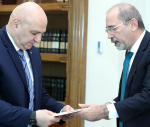You are here
Further victory for Abbas?
May 21,2014 - Last updated at May 21,2014
Early signs of efforts to produce a unity Palestinian government reflect many of challenges, expected after a seven-year-long division.
News from Ramallah and Gaza reveals the apparent capitulation of Islamic Hamas to its nationalist adversary.
The choice of prime minister appears to be moving in the direction of the PLO. While the reconciliation agreement reached in Doha stipulated that Mahmoud Abbas would be prime minister in order to avoid friction, shortly after the Shatti reconciliation agreement was signed, a small addition was made, namely that the prime minister will be either Abbas or someone he chooses.
With time, the latter became accepted narrative of the reconciliation debate, and now the most likely prime minister of the unity government will be the incumbent PM Rami Hamdallah.
Another sign of the political victory scored by the PLO-led negotiating team concerns the issue of whether the new government will require the vote of confidence of the inactive Palestinian Legislative Council (PLC).
The PLO team is not interested in reactivating the PLC, in which pro-Hamas candidates won the majority of seats.
A Hamas leak that Ismail Haniyeh, who headed the Reform and Change list, was likely to become the speaker of the council was quickly knocked down.
Haniyeh, who has been the prime minister of the Hamas government in Gaza, will have no role in the new government, according to the agreement which states that neither Fateh nor Hamas will have any representative in the new technocrat unity government.
The new government will swear in at the Ramallah headquarters of the Palestinian presidency, in front of Abbas.
The names of the members of the new government are important, especially for key ministries such as interior, foreign, finance and international development.
A list allegedly representing suggested names has been published on some local and international websites. It shows names suggested by both Hamas and Fateh for ministries in West Bank and Gaza.
It will be interesting to see which names are finally agreed upon and what percentage of names suggested by the PLO will be eventually chosen.
My prediction is that the major ministries will be given to Fateh nominees, while some of the less important ministries might go to Hamas, even though the names supposedly do not belong to either faction.
The discussion and near agreement on the new government will clearly represent a major breakthrough for Palestinians in years.
It will establish a system of duplicated governments, in Ramallah and Gaza, but it will take some time before all the thorny issues connected to the split will be totally resolved.
Perhaps the biggest problem to be resolved yet is the situation of the security forces loyal to Hamas in Gaza.
The Islamist movement will no doubt insist that these forces are part of the resistance against the Israeli occupiers, while the PLO will say that these so-called resistance fighters are deeply implicated in internal violence that has nothing to do with resistance.
Another major problem is the restructuring of the PLO to incorporate members of Hamas and other Islamic movements.
The big question is whether the Hamas leadership will agree to have its members in the PLO in proportional representation (that will be reflected in elections) or will continue to insist on some kind of fixed quota that guarantees them a certain percentage in all PLO bodies.
A sensitive problem that will also require resolution is community reconciliation. Individual cases of injury and death caused by one side or the other during the dark years of the split, especially in Gaza, will need to be addressed in a satisfactory way.
If this issue is not satisfactorily resolved, there will sure be a continuation of the instability and internal violence.
Naturally, the presidential and parliamentary elections planned no longer than six months after the swearing in of the new government will help show the direction the Palestinian people wants to move in.
Reconciliation has clearly taken off, mostly in the direction of the PLO.
While Hamas will be able to register some small successes here and there, it is clear that we are witnessing a clear victory for Abbas and his PLO movement, and a near surrender and capitulation of Hamas.
It is ironic that despite the clarity of this result, Israelis and some in the US are still attacking the reconciliation agreement, which puts into question their own desire for peace and tranquility, and a single leadership for the entire Palestinian population.












